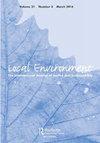手工采煤对环境影响的看法与-à-vis科学现实:以南非夸祖鲁-纳塔尔省的一个社区为例
IF 2.8
3区 环境科学与生态学
Q3 ENVIRONMENTAL STUDIES
引用次数: 0
摘要
摘要本研究调查了南非夸祖鲁-纳塔尔省Blaauwbosch农村社区非正式煤矿开采对环境的感知影响。数据是通过问卷调查、焦点小组讨论和关键线人访谈提取的,目的是了解社区成员、政府官员、非正式煤矿工人、当地学校的学习者和教育者对非正式煤矿开采的环境影响的看法。在对参与者进行分层后,意识到煤矿开采对环境影响的社区成员将糟糕的空气质量作为煤矿开采最关键的影响,而教育工作者和学习者则提到了景观改造。社区成员普遍不满意政府对遏制煤炭开采影响的干预,而教育工作者和学习者则感到满意,因为他们认为政府的反应缓慢而费力。因此,除了在社区内开展提高认识运动以改善关于非正规煤炭开采不利条件的信息获取之外,政府还应加强努力,对拟议的回应采取有效的后续行动。政府还应设计干预措施,解决该地区的高贫困和高失业率问题,以减少社区对非正规煤炭开采活动的参与。作者感谢数据收集助理和两位匿名审稿人对本文草稿的阅读。披露声明作者未报告潜在的利益冲突。本文章由计算机程序翻译,如有差异,请以英文原文为准。
Perceptions of environmental impacts of artisanal coal mining vis-à-vis the scientific reality: a case of a community in South Africa's Kwazulu-Natal Province
ABSTRACTThe current study investigated the perceived impact of informal coal mining on the environment of a rural community in Blaauwbosch, KwaZulu-Natal Province, in South Africa. Data was extracted through questionnaires, focus group discussions and key informant interviews targeting perceptions from community members, government officials, informal coal miners, learners and educators of a local school on the environmental impacts of informal coal mining. After stratifying the participants, community members aware of the environmental impacts of coal mining cited poor air quality as the most critical impact of coal mining, while educators and learners mentioned landscape transformation. Community members were generally not satisfied with government's interventions towards containing the impact of coal mining, while educators and learners were somewhat satisfied as they felt government response was slow and laboured. Therefore, in addition to awareness campaigns within the community to improve information access regarding the disadvantages of informal coal mining, the government should intensify its efforts by implementing effective follow-ups on proposed responses. The government should also design interventions to address the area's high poverty and unemployment levels to reduce community engagement in informal coal mining activities.KEYWORDS: Air qualityinformal minersland degradationwater pollution AcknowledgementsThe authors appreciate the assistance of the data collection assistants and two anonymous reviewers for reading the draft of the manuscript.Disclosure statementNo potential conflict of interest was reported by the author(s).
求助全文
通过发布文献求助,成功后即可免费获取论文全文。
去求助
来源期刊

Local Environment
Environmental Science-Management, Monitoring, Policy and Law
CiteScore
4.10
自引率
4.20%
发文量
88
期刊介绍:
Local Environment: The International Journal of Justice and Sustainability is a refereed journal written by and for researchers, activists, non-governmental organisations, students, teachers, policy makers and practitioners. Our focus is specifically on sustainability planning, policy and politics in relation to theoretical, conceptual and empirical studies at the nexus of equity, justice and the local environment. It is an inclusive forum for diverse constituencies and perspectives to engage in a critical examination, evaluation and discussion of the environmental, social and economic policies, processes and strategies which will be needed in movement towards social justice and sustainability - "Just Sustainabilities" - at local, regional, national and global scales.
Please note that we only accept submissions that share our focus. Based on critical research and practical experience, we are particularly seeking submissions from nations and continents representing different levels of income and industrial development and from countries in transition in order to engage in mutual learning and understanding.
 求助内容:
求助内容: 应助结果提醒方式:
应助结果提醒方式:


